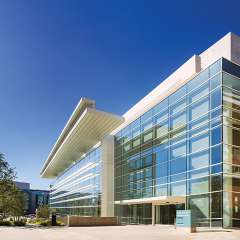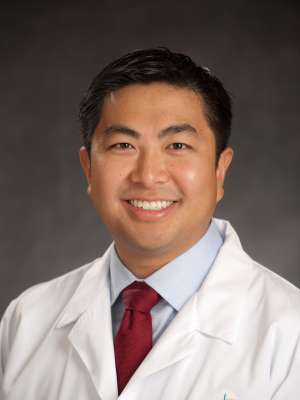Isaac Yang, MD
- Brain and Tumor Neurosurgery|
- Neurosurgery
About
Additional Education
- NRSA Post Doctoral Brain Tumor Fellowship, UCSF Brain Tumor Research Center, 2008-2009
Dr. Isaac Yang is a neurosurgeon specializing in the surgical treatment and clinical outcomes of adult brain and spinal cord tumors at UCLA with an emphasis on acoustic neuromas, skull base tumors, and state of the art, intra-operative brain motor and neurophysiologic mapping to safely maximize tumor resection.
Dr. Yang is experienced in neuro-oncology surgical treatment for patients with very complex brain tumors, skull base tumors, acoustic neuromas, meningiomas, astrocytomas, oligodendrogliomas, anaplastic astrocytomas, and glioblastomas. Dr. Yang has received a number of national awards and grants to honor his research work in brain tumors and excellence in treating and caring for patients. As a principal investigator at the UCLA Brain Tumor Program, his extensive research interests include optimizing brain tumor clinical outcomes, novel nanoparticles against brain tumors, and experimental glioblastoma therapies like brain tumor vaccines. Dr. Yang is collaborating with the UCLA NanoSystems Institute to utilize novel nanoparticles in cutting edge use of nanoparticles for potential brain tumor treatments and immunotherapy. In addition to his basic science research, Dr. Yang conducts research efforts into brain tumor outcomes of patients with brain tumors seeking to maximize safe and effective treatments for patients with brain tumors.
As the oldest son of South Korean immigrants, Isaac Yang was born in Chicago, Illinois and grew up in Lodi, California in the central valley. Dr. Yang received his undergraduate degree from UC Berkeley with a double major in Molecular and Cell Biology emphasis in Neurobiology and Social Welfare emphasis in Sociology with highest honors and Phi Beta Kappa.
Dr. Yang earned his medical degree from the UCLA David Geffen School of Medicine with AOA honors and publishing his early brain tumor research earning the UCLA Lasky Memorial Research Award. He matriculated to his residency at the University of California, San Francisco (UCSF) where he graduated with Naffziger Resident of the Year honors. While at UCSF, Dr. Yang also completed a postdoctoral fellowship in brain tumor molecular biology and immunotherapy in the UCSF Brain Tumor Research Center. Dr. Yang is dedicated to improving the care and treatment of all patients with brain tumors.
Patient Stories
Superior Canal Dehiscence Syndrome (SCDS) - Karrie's Story
Learn more about Dr. Yang's research and lab.
Languages
Education
Medical Board Certification
Fellowship
Residency
Internship
Degree
Recognitions
- Super doctors, Southern California, 2025
-
 Top doctors, Los Angeles Magazine's Top Doctors 2025
Top doctors, Los Angeles Magazine's Top Doctors 2025
- Super Doctors® Southern California, 2024, 2025
- Top Doctors, Los Angeles Magazine, 2024, 2025
- North American Skull Base Society Research Grant, 2020
- See More
Locations

Medical Services
Areas of Focus
Videos
Research
Interests
Professor and Neurosurgeon specializing in adult brain and spinal cord tumors at UCLA, Dr. Yang is experienced in the surgical treatment for patients with skull base tumors, acoustic neuromas, meningiomas, astrocytomas, oligodendrogliomas, anaplastic astrocytomas, and glioblastomas. As a principal investigator at the UCLA Brain Tumor Program, his extensive research interests include optimizing brain tumor clinical outcomes, novel nanoparticles against brain tumors, and experimental glioblastoma therapies like brain tumor vaccines.
Isaac Yang M.D. is a Board Certified Neurosurgeon and Director of Medical Student Education in the UCLA Department of Neurosurgery, Professor in Neurosurgery, Head and Neck Surgery, and Radiation Oncology in the David Geffen School of Medicine at UCLA, and a Principal Investigator in the UCLA Brain Tumor Laboratory. As the son of South Korean immigrants, Dr. Yang grew up in the small town of Lodi, California. Dr. Yang’s interest in neurobiology started as an undergraduate as he received his bachelor’s degree with Phi Beta Kappa from the University of California Berkeley. His training followed with a medical degree from the University of California Los Angeles Geffen School of Medicine. Dr. Yang completed a neurological surgery residency at the University of California San Francisco, as well as an NRSA NIH funded F32 post doctoral brain tumor research fellowship.
Dr. Yang’s clinical focus has been primarily on brain tumors both glioblastoma and skull base tumors. His research efforts have examined antigen expression and manipulation of the immune response to glioblastoma. He has previously been recognized with a UCSF Clinical and Translational Scientist Training Award and the CNS Dandy Clinical Research Fellowship. Dr. Yang has been the recipient of several distinguished regional and national awards including the UCSF Medical Center 2010 Exceptional Physician Award, the AANS Integra Brain Tumor Research Award, San Francisco Neurological Society Edwin Boldrey Award for Basic Science Research, American Academy of Neurological and Orthopedic Surgeons Research Award, Kaiser Award for Clinical Research, the national AANS Leksell Radiosurgery Award, and the Tumor Section Ronald L. Bittner Award on Brain Tumor Research.
Dr. Yang has published over 200 publications in peer-reviewed journals, authored over a dozen book chapters, and edited over half a dozen published textbooks. Dr. Yang is highly sought out by peers, patients and the media for his expertise in neurological diseases and brain health. He has made multiple TV appearances on CBS The Doctors, CNN Dr. Drew On Call, and national news outlets. At UCLA, he is currently investigating the utilization of nanoparticles and nanotechnology for the application in brain tumor immunotherapy and vaccines, investigating the role of radiosurgery and Adaptive Hybrid Surgery for skull base tumors, identifying novel biomarkers for meningiomas, and redefining the treatment outcomes for successful skull base surgery in Superior Semicircular Canal Dehiscence. His career is dedicated to improving the care and treatment of all patients with skull base pathology and brain tumors, and he is deeply indebted to his wife Nancy for her support and all of his teachers and mentors who have guided him on this path.
If interested please follow Dr. Yang on Facebook at Isaac Yang UCLA Neurosurgery or find his most recent book Service Minded Physician on Amazon.
Publications
Peer Reviewed Publications
- Berg J, Chandrasoma S, Yang I, Lynch JB, Walling A. Learning about bioterrorism and chemical warfare - Medical students explore key threats. Western Journal of Medicine, 2002. 176 (1): p. 58-59.
- Liau LM and Yang I. Microarrays and the genetic analysis of brain tumors. Current Genomics, 200 3 (1): p. 33-41.
- Thakur A, Yang I, Lee MY, Goel A, Ashok A, and Fonkalsrud EW. Increasing social capital via local networks: Analysis in the context of a surgical practice. American Surgeon, 2002. 68 (9): p. 776-9. PMID: 12356148
- Thakur A, Yang I, Lin A, Buchmiller-Crair T, Fonkalsrud EW. Management of ovarian cysts in women undergoing restorative proctocolectomy for ulcerative colitis. American Surgeon, 2003. 69 (4): p. 339-42. PMID: 12716094
- Yang I, Kremen TJ, Giovannone A, Paik E, Odesa SK, Prins RM, and Liau LM. Modulation of major histocompatibility class I molecules and MHC-bound immunogenic peptides by interferon-a and interferon-g treatment of human glioblastomas. Journal of Neurosurgery, 2004. 100: p. 310-319. PMID: 15086239
- Bergsneider M, Yang I, Hu X, McArthur DL, Cook SW, and Boscardin WJ. Relationship between valve opening pressure, body position, and intracranial pressure in normal pressure hydrocephalus: Paradigm for selection of programmable valve pressure setting. Neurosurgery, 2004. 55 (4): p. 851-859. PMID: 15458593
- Boudreau C, Yang I, and Liau LM. Gliomas: Advances in molecular analysis and characterization. Surgical Neurology, 2005. 64 (4): p. 286-294. PMID: 16229087
- Yang I, Barbaro NM. Advances in the radiosurgical treatment of epilepsy. Epilepsy Currents, 2007. 7 (2): p. 31-35. PMID: 17505557
- DeIpolyi AR, Yang I, Buckley A, Larson DA, Smith V, Barbaro NM, Cheung SW, Parsa AT. Fluctuating response of a cystic vestibular schwannoma to radiosurgery. Neurosurgery, 2008. 62(5):p. 1164-5. PMID: 18580785
- Yang I, Lawton MT. Clipping of complex aneurysms with fenestration tubes: application and assessment of three types of clip techniques. Neurosurgery, 2008. 62 ONS (2): p. 371-9. PMID: 18596517
In the News
More information on Dr. Yang
- Cutting-Edge Skull Surgery for Rare Condition (The Doctors, April 2015)
- Special Olympics Athlete Gives Surgeon His Gold Medal After Life-Saving Brain Surgery (People, July 2016)
- Woman Who Could Hear Her Own Body Sounds Get Life Back (ABC’s Good Morning America, September 2015)
- Indiana woman, has op to cure condition that meant she could hear mechanics of her body (UK's Daily Mail, September 2015)
- Indiana woman who suffered for seven months with a rare disorder that constantly broadcast into her ears the sounds of her eyeballs moving, heart beating, footsteps echoing and food digesting (Fox News 11, September 2015)
- UCLA doctors perform life-changing surgery on woman plagued by internal sounds of her body (UCLA Newsroom, September 2015)
- UCLA Doctors Treat Woman Who Can Hear Her Body Working Due to Rare Condition (KTLA 5, September 2015)
- WEIRD SCIENCE: Woman Can Hear Her Body Working (Bill Carroll Show, September 2015)
- Internal Hearing Surgery (KCBS/KCAL, September 2015)
- Lodi’s Isaac Yang receives award for medical, teaching excellence (lodinews.com, March 2015)
- Nationally lauded medical educator invests in success of his students (newsroom.ucla.edu, February 2015)
- UCLA Students rally against Alzheimer's (Aging Today, Jul-Aug 2011)
- Dr. Yang to receive award (Daily Bruin, April 2011)
- UCSF recognizes exceptional physicians (UCSF, May 2010)
- Neurosurgery chief resident receives UCSF Medical Center Exceptional Physician Award (UCSF, April, 2010)
- Winners of 62nd Annual Meeting of the SF Neurological Society in Sonoma, CA San Francisco Neurological Society, February 2010)
- Dr. Isaac Yang honored for breakthrough research (LodiNews.com, May 2009)
- Live-Tweet Surgery (headandnecksurgery.ucla.edu)
Note: News links may expire without notice.
Insurance
- Aetna
- Anthem Blue Cross
- Blue Shield of California
- Centivo
- Cigna
- First Health
- Health Net of California
- Interplan (part of HealthSmart)
- Medicare Advantage
- MultiPlan
- UFCM Health System
- Prime Health Services
- Private Healthcare Systems (PHCS)
- TRICARE
- UnitedHealthcare
The list of health care plans above may not be comprehensive and could change.
Please contact your benefits coordinator or health insurance company directly to verify coverage.
Visit our health insurance information page for more details.
Recognitions
Honors and Special Awards
- Super Doctors® Southern California, 2024, 2025
- Top Doctors, Los Angeles Magazine, 2024, 2025
- North American Skull Base Society Research Grant, 2020
- UCLA Neurosurgery Gold Batzdorf Resident Teaching Award, 2019
- Southern California Super Doctors, 2013-2021
- Castle Connolly Top Doctors, 2017- 2021
- Andrew T Parsa Mentorship Award, 2019
Presented at the 65th national AMSA meeting Washington D.C.
- UCLA Neurosurgery Batzdorf Resident Teaching Award, 2014
- UCLA DGSOM Outstanding PBL Tutor Award, 2014
- UCLA DGSOM Tow Humanism in Medicine Award, 2014
- American Association of Neurological Surgeons CME Award, 2014
- UCLA AMSA Golden Apple Award, 2014

